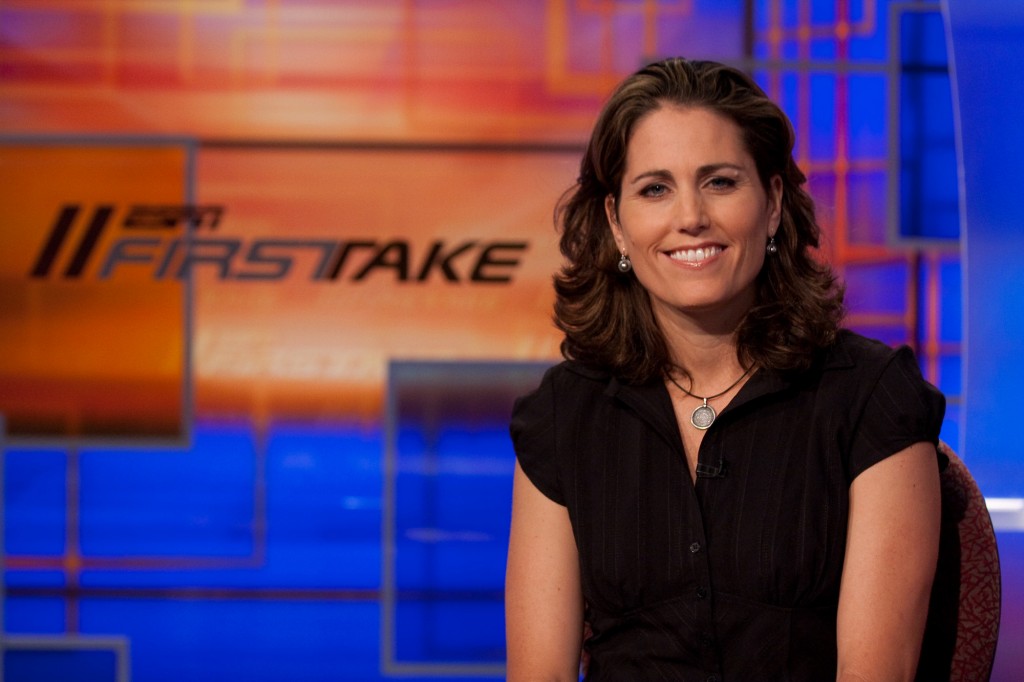Shadowing Julie Foudy
 Editor’s note: Front Row will provide weekly updates leading up to the 2011 FIFA Women’s World Cup in Germany, which kicks off June 26. Upcoming stories will highlight ESPN’s on-air talent and behind-the-scenes staff, a look at ESPN’s unique production facilities, and some first-person memories from the historic 1999 Women’s World Cup.
Editor’s note: Front Row will provide weekly updates leading up to the 2011 FIFA Women’s World Cup in Germany, which kicks off June 26. Upcoming stories will highlight ESPN’s on-air talent and behind-the-scenes staff, a look at ESPN’s unique production facilities, and some first-person memories from the historic 1999 Women’s World Cup.
After 15 years of anticipation, I finally realized my childhood dream.
Not everyone gets to work alongside his or her childhood heroes, but I’m one of the lucky few.
Last Tuesday, I got to shadow ESPN soccer analyst Julie Foudy as she played guest host for First Take.
For me, Julie and her teammates on the U.S. National Team delivered the “most iconic women’s sports moment” when they captured the 1999 Women’s World Cup before 90,185 fans at the Rose Bowl.
It was a moment I witnessed watching television as an 11-year-old in Scarsdale, N.Y., proudly displaying my hand-drawn “Let’s Go USA” sign.
I was hooked on soccer.
Now at 23, I’m a researcher for ESPN The Magazine and assisting with Women’s World Cup coverage for espnW.
This is my first job out of Carnegie Mellon University.
Shadowing Julie provided me an opportunity to spend a morning with her as she hosted First Take.
Overcoming fandom to become a professional isn’t as easy as it sounds, as many of us at ESPN have dealt with at some point.
It was initially hard to shake that middle school mentality, but as I get older, I don’t want photographs or autographs; I want to be considered an equal while still showing my appreciation for what’s been done for the sport. (I’ve played soccer since I was four and played defender briefly in college before injuries took their toll).
I arrived in the newsroom at 6:30 a.m. (still half asleep) and introduced myself to Julie.
I watched as the First Take team researched for the show and bounced ideas off one another.
At 8:30, I followed her to the makeup room as she got the full diva experience — but she ain’t no diva.
We sat in the green room, fumbling with the 20 televisions’ remote controls. Then we headed to the set around 9:30 a.m. where I was in awe of the teleprompter (reminded me of Anchorman) and dynamic cameras, taking note that live TV is really live, live.
What I realized throughout the course of the morning is that Julie’s down to earth.
She and her colleagues share anecdotes about that one time at the airport and their children’s first swimming experiences. They make jokes, and even give into peer pressure once in a while (Julie recently joined the masses of Twitter after years of fighting it @JulieFoudy).
Sure, I asked a lot of questions that showed my admiration for the Golden Era, but once that awkwardness was cast away, I felt comfortable in my new role as coworker.
The day ended with some one-on-one time as we walked to ESPN’s cafe, discussing gold medals, teammates, and the future of the game.
After six hours spent with my childhood hero, I was able to cross a major goal off my “To Do” list.
I know that the next time we cross paths (which will be soon in this small soccer world), I made a new friend.
Now, not many people can say that either.
***********
Here are some questions I had for Julie:
FR: What were you up to at 23 years old?
Foudy: I was playing part-time in Sweden and part-time with the Women’s National Team, preparing for the 1995 World Cup. I was studying for the MCATS and applied to med school in 1994. I was then accepted to Stanford Medical.
FR: Why sports over medicine?
Foudy: I was playing in the 1996 Olympics and would have to start classes three weeks later. I knew I wasn’t ready to make that flip, so I deferred a year and took that year to ask doctors questions — any doctor I saw. Discouragingly they told me if it’s your calling, you’ll know, but if not, run. As an athlete, I was fascinated by the human body and how it worked, I deferred another year though, but it just wasn’t the right fit.
FR: What’s your role in the future of the game?
Foudy: I’m an activist at heart; it’s in my blood. What we did for soccer in this country and the way it was treated, we pioneered. We fought hard for every bit of it, and we were change-makers. Sports gave me a voice.







